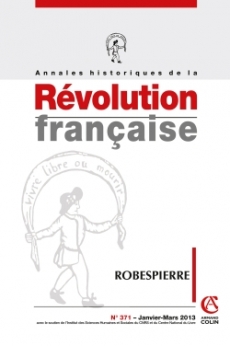
Annales historiques de la Révolution française n° 371 (1/2013)
Pour acheter ce numéro, contactez-nous
Recevez les numéros de l'année en cours et accédez à l'intégralité des articles en ligne.
Benjamin Constant established the liberal tradition by constructing it in opposition to Robespierre whose levelling policy would have harmed the rights of property owners. Robespierre’s discourse about freedom was therefore a decoy: he reasoned in the Roman style and confused the freedom of the Ancients, where the individual and his property were subject to the community, with that of the Moderns, through which the individual property owner could blossom. Alternative readings, particularly in the Marxist tradition, highlight, on the contrary, the essentially opportunistic dimension of Robespierre’s brand of socialism. First of all, he should be considered as a partisan of economic liberalism, a defender of property and the bourgeois revolution. In the face of these dominant interpretations in which liberty and equality are counterposed, other points of view highlight Robespierre’s egalitarian liberalism.

